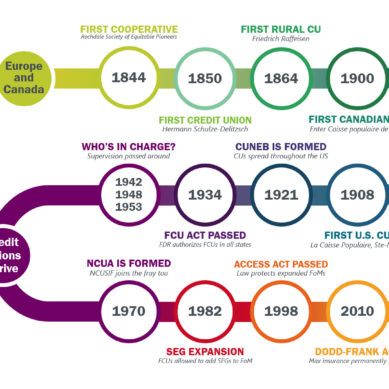In April 2023, the NCUA approved in a 2-1 vote a request for information on “current and future climate and natural disaster risks to federally insured credit unions, related entities, their members, and the National Credit Union Share Insurance Fund.”
The argument for such a move was that climate-change-related disasters are costly and are becoming even more so. Business Continuity expert Danielle Caliendo wrote about the impact of these occurrences on credit unions and noted that “the year 2020 was the most expensive year yet for weather and climate-related disasters. There were 22 separate billion-dollar weather and climate disasters across the United States in 2020 and there were another 20 separate billion-dollar disasters in 2021.”
As credit unions are not immune to damage from natural disasters, the NCUA believes they have an obligation to assess the influence climate change will have on the industry.
“As a regulator and insurer, the NCUA has a duty to ensure the institutions it oversees remain resilient against all material risks. Those risks include climate-related financial risks,” NCUA Chairman Todd M. Harper said. “This request for information is essential to furthering our understanding of these issues and their implications for the overall resiliency of individual credit unions, the vibrancy of the credit union system, and the strength of the National Credit Union Share Insurance Fund.”
Now, shortly before comments are due, a few stakeholders are arguing that the NCUA not only lacks knowledge on the topic with which to implement any kind of climate change regulation but is also ignoring bigger issues. They are urging the NCUA to drop the subject completely.
Doug Wadsworth, president of Tri-Cities Credit Union in Washington strongly opposes any research into climate change by the NCUA, arguing that there are higher priorities for the agency at the moment, despite a report from the NCUA stating that one-quarter of all federally insured credit unions are in communities that have a relatively high or very high risk of experiencing the negative effects of natural hazards, accounting for a total of 34% of system-wide assets.
“When it comes to spending money and resources,” said Wadsworth, “I think the NCUA should stick to helping credit unions be financially strong and resilient, by better serving members in a rapidly changing technological world: We need to worry much more about how digital currency or AI will hurt us, rather than a 1-degree temperature change, spread out over the next 100 years.”
The National Federation of Independent Business (NFIB) echoed Wadsworth’s sentiments, stating that the NCUA should not require credit unions to gather climate-related information from small business members as they lack the finances and means to obtain such data. Furthermore, they argued the agency lacks the expertise to enact meaningful regulations.
Comments for climate change are due to the NCUA on June 26th, but regardless of what action (or lack of action) the NCUA takes, many are urging credit unions to consider the effects climate change might have on their credit union and plan accordingly.
In her article on climate change and credit unions, Caliendo noted that the impact of climate change is creating unprecedented disasters in areas where such disasters may not have occurred before, citing the heat waves in the Pacific Northwest as an example. Lack of planning on credit unions’ part could result in increased costs and downtime.
“Expand your scope of planning to include situations not common for your geographic location and think about what else you should be planning for,” says Caliendo. “What is the next shifting natural disaster? Polar vortexes in Florida or tropical storms in Canada? It may seem impossible, but weather patterns are quickly changing.”































































